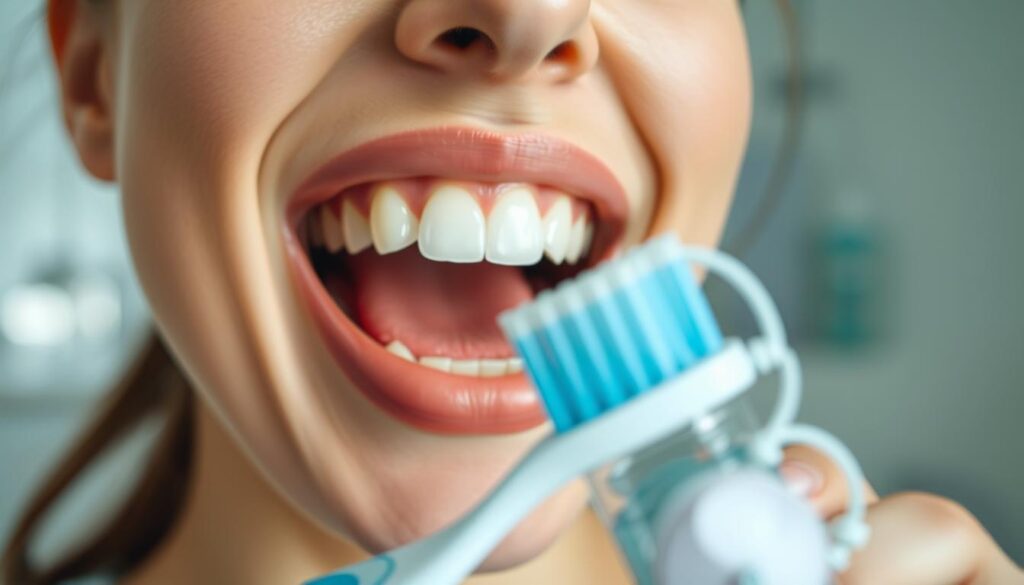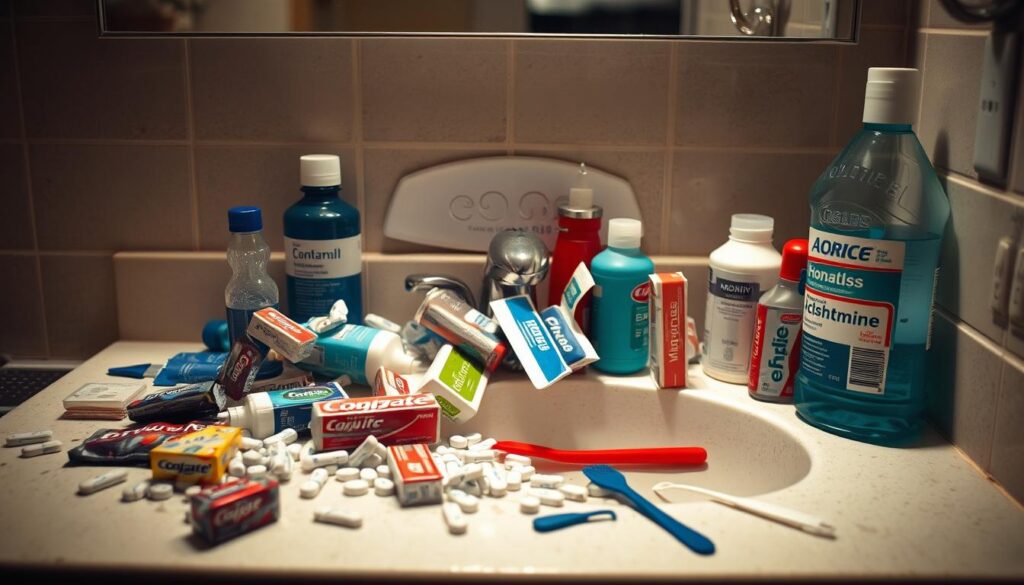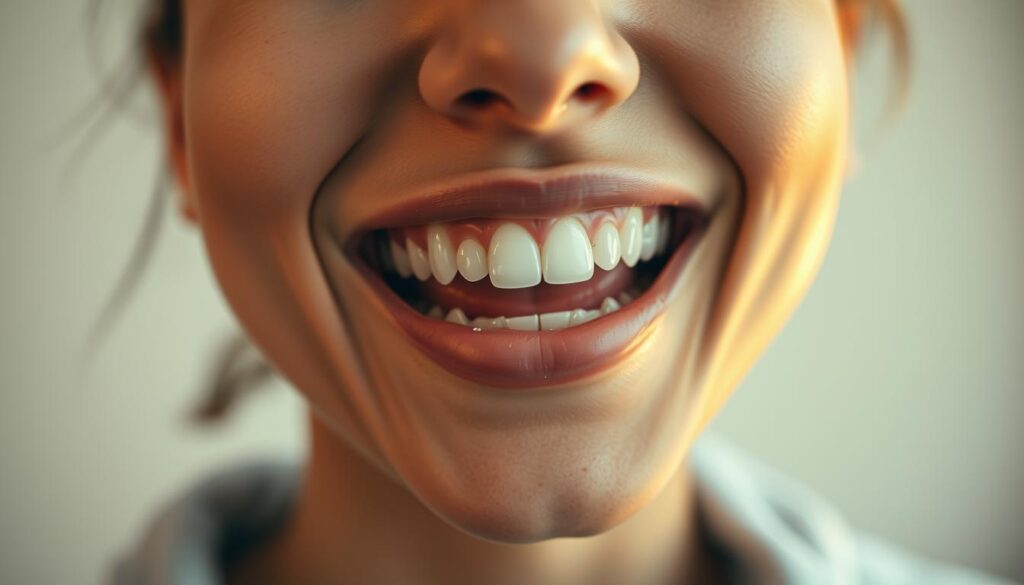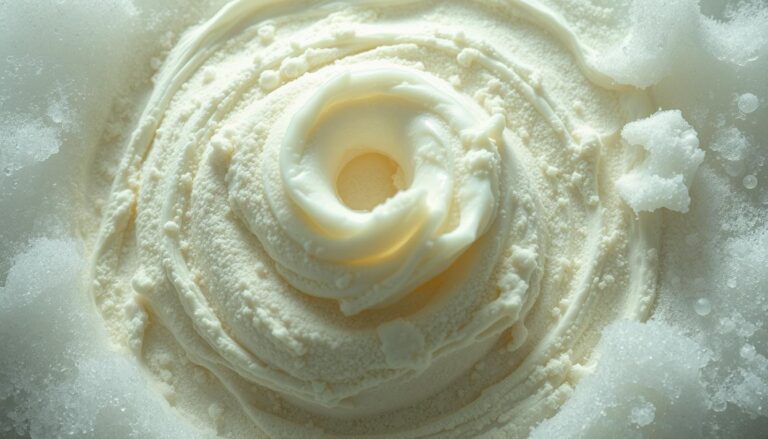Can a Dental Cleaning Cure Bad Breath?

Many people wonder if a dentist visit can stop bad breath for good. They ask, “Can a dental cleaning cure bad breath?” This question is common among those who struggle with halitosis and want a reliable solution.
Cleanings remove plaque and tartar, which hide bacteria that cause bad breath. These bacteria release sulfur compounds, leading to bad smells. A professional cleaning targets these hidden areas, improving your breath and health.
Key Takeaways
- Dental cleanings reduce plaque that leads to foul odors.
- Volatile sulfur compounds form when bacteria break down proteins.
- Gum disease can worsen halitosis without consistent care.
- Professional cleanings disrupt odor-causing bacteria colonies.
- Comprehensive oral hygiene is key to lasting fresh breath.
Understanding Bad Breath: Causes and Solutions
Many people deal with bad breath because of bacteria in their mouths. Things like how much saliva you have, the state of your teeth, and what you eat can affect this. Keeping your mouth clean is key to avoiding bad breath.

Common Causes of Bad Breath
Bad breath can come from many sources. Gum disease can make tissues inflamed, which attracts bacteria. Plaque buildup also leads to more bacteria, making smells worse. Not brushing or flossing regularly can make things even worse.
Medical Conditions That Contribute
Some health issues can also cause bad breath. Dry mouth or sinus problems can help bacteria grow. Some medicines can make your mouth dry, leading to bad smells. Chronic stomach acid can also cause bad breath.
Lifestyle Factors Affecting Freshness
Eating strong-smelling foods or drinking coffee and soda can leave bad odors. Smoking introduces smells that stick to your gums. Drinking enough water helps keep your mouth moist and fresh. Taking care of your mouth can keep it smelling good.
The Role of Dental Cleanings
Regular dental checkups are key to keeping your mouth healthy. They remove harmful buildup and prevent gum problems. Professional cleanings get rid of hidden plaque and polish your teeth, making them fresher.
What Happens During a Dental Cleaning?
Dentists use special tools to remove plaque and tartar. This includes scraping above and below the gumline. After, they polish your teeth to stop bacteria from growing back. Sometimes, they apply fluoride for extra protection.
Types of Dental Cleanings Available
Some people just need a routine cleaning, while others need deeper treatments. Scaling and root planing is for serious gum inflammation. Regular checkups help catch problems early. Learn more in this resource.
Benefits of Regular Dental Cleanings
Going for regular cleanings makes your mouth feel better and keeps it healthy. They help prevent cavities, bleeding gums, and bad breath. Catching problems early can save your teeth from bigger issues later.
| Type of Dental Cleaning | Key Focus |
|---|---|
| Routine Prophylaxis | Basic plaque removal above the gumline |
| Scaling and Root Planing | Deeper gumline treatment for advanced tartar |
| Periodic Deep Clean | Targeted approach for persistent inflammation |
The Connection Between Dental Hygiene and Bad Breath
Good oral care makes your mouth feel fresh. Brushing and flossing daily keeps teeth clean. This stops bad smells from forming.
How Oral Health Affects Breath Quality
Healthy gums and teeth come from regular cleaning. Clean teeth and gums mean less bad breath. Regular dentist visits help catch problems early.
Bacteria and Their Role in Odor
Bacteria make bad smells when they break down food. They live in tight spots around teeth. To fight bad breath, clean well and see your dentist often.
Importance of Plaque Removal
Plaque attracts germs and causes stains. Removing it stops bacteria growth. This keeps your mouth healthy and smelling good. A good plan for fresh breath includes:
- Gentle but thorough brushing techniques
- Flossing to reach hidden food remnants
- Professional maintenance that reduces odor-causing buildup
Professional vs. At-Home Solutions
Is at-home care enough to tackle hidden plaque and odor-causing bacteria? Creating a pleasant breath environment often requires deeper attention beneath the gumline. Ordinary methods struggle here. These visits catch early signs of gum disease that may worsen without expert care.
Comparing Dental Cleanings and Mouthwashes
Mouthwashes can temporarily neutralize certain odors, but hardened tartar stays intact. Dentists use special instruments to remove stubborn deposits, supporting lasting freshness. A professional teeth cleaning achieves results that self-directed rinses cannot always match.
The Impact of Regular Toothbrushing
Brushing with a fluoride toothpaste helps reduce plaque colonies and dislodge debris before it turns into calculus. Technique matters: small, circular strokes around the gum area promote healthier tissue and minimize lingering impurities.
Flossing’s Role in Fresh Breath
Daily flossing reaches areas beyond a toothbrush’s bristles. By dislodging trapped particles, it significantly lowers bacterial buildup and fosters a cleaner environment. Combined with professional teeth cleaning, flossing supports long-term defense against persistent halitosis.
When Dental Cleanings May NOT Solve Bad Breath
Even the most thorough dental cleanings don’t always get rid of bad smells. Dry mouth or hidden microbes can make it hard to keep breath fresh. Adding other strategies can help turn ongoing discomfort into lasting relief.

Persistent Bad Breath: When to Seek Help
If bad breath keeps coming back, even after dental cleanings, it’s time to see a healthcare provider. Sinus problems or digestive issues can cause long-lasting smells. Getting help early can prevent bigger problems and help find better solutions.
Other Treatments and Interventions
There are many ways to tackle bad breath, like special mouth rinses or gum therapy. Changing your diet or managing stress can also help. These steps can be taken along with regular dental check-ups to keep improving.
Evaluating Underlying Health Issues
Sometimes, bad breath can be a sign of a bigger health problem. Finding and treating infections or metabolic disorders is key. Working with both dental and medical teams ensures a complete approach to health.
Importance of Regular Dental Visits
Regular dental checkups are key to keeping your teeth and gums healthy. They help spot small cavities and gum problems early. Professional cleanings also remove plaque, which keeps your smile bright and fights bad breath.

How Often Should You Get a Cleaning?
Most people need a cleaning every six months. But, if you’re at risk for gum disease, you might need to go more often. Each visit includes removing plaque and teaching you how to brush, floss, and use mouthwash better.
Building a Relationship with Your Dentist
Having a long-term relationship with your dentist helps them understand your needs better. You can ask them about any new symptoms or questions about caring for your teeth at home. This connection leads to a plan that’s just right for you.
What to Expect at Your Dental Appointment
At your appointment, your dentist will check for any signs of decay or weak spots. Then, they’ll clean your teeth thoroughly, focusing on areas that are hard to reach. They’ll also give you tips on how to avoid discomfort and bad breath.
Oral Hygiene Tips for Fresh Breath
Good oral care keeps your mouth clean and fresh. It’s important to fight bacteria that cause bad breath. Also, remove debris from hard-to-reach spots.
Daily Routines to Maintain Freshness
Brushing your teeth, tongue, and inner cheeks gets rid of trapped particles. Use gentle methods and floss or a water flosser for under the gumline. A soft-bristled toothbrush protects your enamel and gums.
- Choose fluoride toothpaste to defend against decay.
- Examine labels for American Dental Association approval.
- Replace your toothbrush every three months.
Recommended Dental Products
Special toothpastes cut down on bacteria and freshen your breath. Look for Crest and Colgate products that fight biofilm. Antimicrobial mouth rinses also help keep your mouth clean. Regular dental checkups are key, as advice from professionals suggests.
Hydration and Its Effects on Breath
Dryness often leads to bad breath. Drinking enough water helps keep your mouth moist. This encourages healthy saliva flow, washing away bacteria. More water intake also stops bacteria growth.
Understanding Bad Breath Myths
Many people are confused about what causes bad breath. They think any mouth spray or candy will fix it. But, these myths can really get in the way of finding real solutions.
Some popular ideas don’t have science backing them up. They might even hide the real problems.
Debunking Common Misconceptions
False beliefs include:
- Using sweet lozenges to combat odor
- Relying on temporary rinses for long-term results
- Avoiding professional cleanings due to cost concerns
These habits might make breath smell better for a little while. But, they don’t really solve the problem. They can even make things worse by hiding the real issues.
The Truth About Popular Remedies
Some strong mouthwashes or tongue scrapers might help a bit. But, they don’t fix deep problems like plaque or gum disease. These issues need a bigger solution.
Just because something tastes good doesn’t mean it works. It might not get rid of bad breath for good.
When to Trust Professional Advice
It’s important to listen to dental experts. They use proven methods that go beyond simple fixes. Their advice can lead to lasting fresh breath.
Influencing Factors Beyond Oral Health
Dental routines are key to fresh breath. But, many lifestyle choices can affect how we smell. Food, habits, and emotions play big roles in our breath.
Keeping an eye on these factors is important for good breath. A good plan includes healthy eating, managing stress, and regular dental visits. This way, we can keep our breath smelling good for a long time.
Diet and Its Impact on Breath
Garlic, onions, and spicy foods can make our breath bad. This is because they release strong smells. It’s vital to clean our teeth well and choose our food wisely.
Smoking and Alcohol Effects
Smoking leaves tar on our teeth, which bacteria love. Alcohol makes our mouth dry, letting bad bacteria grow. Both can make our breath smell bad if we don’t take care of it.
Stress and Breath Quality
Stress can make our mouth dry, letting bacteria grow. This affects how fresh our breath is. Drinking water and relaxing can help keep our mouth healthy.
Can Certain Foods Help Freshen Breath?
Diet is very important for how fresh your breath is. Some foods help by getting rid of bacteria. Others can make it worse by helping plaque grow. Eating well helps keep your mouth clean and fresh.
Best Foods for Combatting Odor
Fruits and veggies are like gentle cleaners. Apples and celery are great because they have lots of fiber. This fiber helps clean out your mouth between brushings. Leafy greens have chlorophyll, which might help reduce bad smells.
Foods to Avoid for Fresh Breath
Too much sugar feeds bacteria. Foods like sweets and sugary drinks can cause plaque. Garlic and onions make bad smells worse because they release sulfur compounds. For tips on how to end bad breath, check out this link.
Role of Chewing Gum and Mints
Sugar-free gum and mints are good because they keep your mouth moist. This helps prevent bad smells. They also help clean your mouth by sparking enzymes in your saliva.
| Item | Potential Benefit |
|---|---|
| Apple | Natural fiber to remove plaque |
| Spinach | Chlorophyll that may neutralize odors |
| Sugarless Gum | Increases saliva production |
| Water | Prevents dryness and flushes bacteria |
The Effect of Age on Breath Quality
Aging changes how we take care of our mouths, affecting our breath. Dry mouth often comes from medicines, letting bacteria grow. This can cause bad smells that bother older people.
Experts say gum recession is common with age. It leads to pockets where plaque builds up. Some seniors might also face bone changes, causing pain and bad breath. Regular dental visits are key to keeping breath fresh.
Here are some tips:
- Drink plenty of water to keep your mouth moist
- Use mouthwashes that kill bacteria
- Talk to your doctor about your medicines
| Common Concern | Impact on Breath |
|---|---|
| Dry Mouth | Encourages bacterial growth |
| Gum Pockets | Contributes to plaque buildup |
| Bone Loss | Increases risk of recession |
The Psychological Impact of Bad Breath
Many people worry and feel uncomfortable about bad breath. This can make them hesitant to talk or go to social events.
Bad breath can hurt your self-esteem. It can make people feel distant from others, affecting both personal and work life. Experts say talking about these feelings with doctors is important.
Confidence Issues Related to Oral Odor
Some feel nervous in groups. Others might hide their mouth or avoid close talks. Getting help early can help fix these problems.
How to Address Concerns with Friends
Talking openly helps everyone understand each other better. Sharing concerns can lead to finding ways to fix bad breath.
Support Systems for Individuals Affected
Having people who care can make a big difference. Dentists can also offer advice and reassurance with regular check-ups.
| Key Psychological Factor | Suggested Approach |
|---|---|
| Anxiety | Seek professional advice to explore solutions |
| Social Isolation | Rely on close networks for open communication |
| Fear of Judgment | Attend supportive counseling or community groups |
Patient Testimonials: Real Experiences
Many patients who once had bad breath have seen big improvements. This is thanks to regular dental cleanings. These cleanings remove plaque from hard spots, making breath smell better.
Fresher breath can make people feel more confident. This is true in both social and work settings.
Success Stories from Dental Cleanings
A recent study by the American Dental Association found a big change. One person with bad breath got better after ultrasonic scaling. This deep cleaning got rid of bacteria under the gums.
Her dentist said regular check-ups are key. They keep the mouth healthy and prevent bad breath.
Overcoming Bad Breath: Patient Journeys
Some people started using special mouth rinses and eating better. They also drank more water. The Mayo Clinic says keeping gums healthy is important for preventing bad breath.
Here’s a table showing what worked well:
| Approach | Outcome |
|---|---|
| Prophylaxis Sessions | Reduced plaque, fresher breath |
| Quality Toothpaste | Active antibacterial effect |
| Improved Hydration | Less dryness, decreased odor |
Conclusion: Beyond Dental Cleanings
Dental cleanings are key for fresh breath and gum health. A professional cleaning removes plaque and reduces bad breath. Dentists in the U.S. follow the American Dental Association’s guidelines for deep cleaning.
Learn more about dental cleaning in the Understanding the Dental Cleaning Procedure resource.
The Need for Complete Oral Care
Dental cleanings help with bad breath, but more is needed for lasting results. Eating well, managing stress, and using mouth rinses are important. If bad breath doesn’t go away, it could be a sign of a bigger health issue.
Staying Proactive About Oral Health
Regular dental visits, flossing, and drinking water help keep breath fresh. Electric toothbrushes from Philips Sonicare or Oral-B can also help. Simple actions like tongue scraping and eating balanced meals are also effective.
Being aware of bad breath can help protect your health and confidence.


